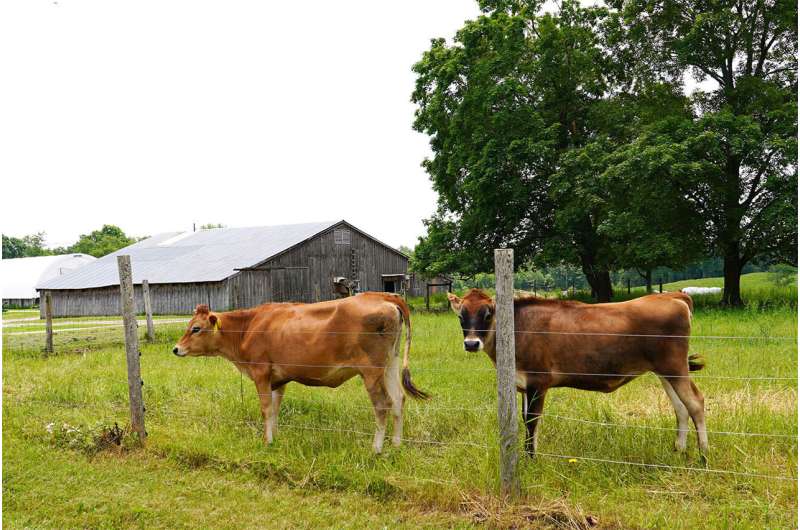This article has been reviewed according to Science X's editorial process and policies. Editors have highlighted the following attributes while ensuring the content's credibility:
fact-checked
trusted source
proofread
Research finds dairy farmers receptive to methane-reducing seaweed feed

New England's dairy industry continues to evolve in response to significant market challenges that include a decreased demand for milk and higher production and land costs. However, there is also ongoing evidence that organic dairy farming can provide environmental benefits—such as reducing methane emissions—which could further differentiate their products as well as help qualify farms for new government initiatives to reduce methane through innovative management practices.
Researchers from the University of New Hampshire have collaborated with researchers in Maine to find evidence that nearly half of organic dairy farmers would be willing to pay a little extra for methane-reducing seaweed feed but would only consider it if it was cost effective, aligned with existing feeding practices and would qualify them for government policies and subsidies.
"Dairy farmers aim to run their farms as lucrative enterprises," said Andre Brito, associate professor of dairy cattle nutrition and management and a scientist at UNH's New Hampshire Agricultural Experiment Station. "The additional cost would require serious considerations, as well as more data and an effective implementation of carbon markets in the future."
In the study, published in Frontiers in Veterinary Science, researchers surveyed 35 Maine organic dairy farmers, all of whom were familiar with seaweed-based feeds and a third of whom were already using such feeds on their farms. Nearly half of respondents reported a willingness to pay, on average, an additional 64 cents per cow per day for methane-reducing seaweed-based feed.
As part of the study, the researchers conducted a feeding trial in Maine's Wolfe's Neck Center for Agriculture & the Environment, where they fed 22 cows a diet containing 6% red seaweed (C. crispus)—locally harvested from the Maine coastline—from February through May 2021. The results of the trial showed that adding this seaweed to the cows' diet reduced methane production by 13.9% without affecting milk production and quality.
"Maine is the birthplace of temperate seaweed farming in the United States and also supports organic certification of seaweeds," said Nichole Price, a senior research scientist with the Bigelow Laboratory for Ocean Sciences and the director of the Bigelow Center for Seafood Solutions. "The close proximity of the nascent seaweed industry to organic dairy farms makes Maine the perfect testbed for this exciting line of inquiry."
The survey also revealed that 93% of the farmers were more concerned about issues like labor shortages, infrastructure problems, rising costs and unstable supply chains, rather than climate change and regulation. This means that farmers would only consider using seaweed in their cows' diets if it were cost-effective and hads additional benefits, while also aligning with existing feeding practices and receiving support from government policies and subsidies.
Co-authors include lead author Diana Reyes, UNH; Jennifer Meredith, Colby College; Leah Puro, Wolfe's Neck Center for Agriculture and the Environment; Katherine Berry, Wolfe's Neck Center for Agriculture and the Environment; Richard Kersbergen, University of Maine Cooperative Extension; Kathy Soder, USDA; Charlotte Quigley, Bigelow Laboratory for Ocean Sciences; Michael Donihue, Colby College; and Dorn Cox, Wolfe's Neck Center for Agriculture and the Environment.
More information: Diana C. Reyes et al, Maine organic dairy producers' receptiveness to seaweed supplementation and effect of Chondrus crispus on enteric methane emissions in lactating cows, Frontiers in Veterinary Science (2023). DOI: 10.3389/fvets.2023.1153097
Provided by University of New Hampshire





















